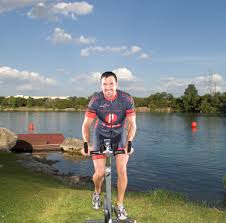I just woke up from a delicious nap. Not your ordinary nap, mind you. This one was induced by a rigorous spin class at my fitness club, Pure Austin. The instructor, Ryon Talbot, is responsible. And he’s the subject of today’s post, not just because he is an excellent trainer (though I hear the proper term these days is “coach”), but because he also exemplifies a number of traits, habits, and attitudes that more of us could consider adopting as we move through our days, do our work, and interact with others.
I first heard about Ryon after working with his wife Christi a few years back. (She, too, is amazing and lovely, by the way.) He has helped some of my friends train for events or simply lay the groundwork for successful fitness routines. He’s also been recognized in the media as one of Austin’s top spin instructors and fitness professionals. And if you want a spot in his spin classes, you’d better get to the gym early because you need a wristband. You know, the kind you need to secure a ticket for a Rolling Stones concert.
The net? After attending one of Ryon’s spin classes, I understood the draw. This guy definitely knows how to train people. But even better, he has an irresistible energy about him that makes hard work fun, What’s more, he models valuable lessons for engaging and motivating others. Here are just a few:
Focus, creativity, and context. When Ryon trains his clients one-on-one, it’s clear he’s all business. He is 100 percent focused on the client, creative in his approach, and mindful of getting the most out of each minute. Put Ryon in front of a spin class, however, and things shift a bit. His inner ham and comedian reveal themselves. “I’ve always been kind of goofy, but I’m very selective about the time, place, and the audience,” Ryon says. “Being goofy makes most people feel a little more at ease. And, let’s face it, life is too short to be serious all the time.”
Humor, enthusiasm, a few antics, and an awesome playlist. As Ryon leads spin class attendees through warmups, intense spin drills, and cool-downs, he definitely expects everyone to give their best effort. (“If you’re not having to breathe in and out through your mouth by now, you’d better at least pretend to be!”) But he also insists on making the experience fun, playing on the energy that comes from a strategically orchestrated playlist mixed with a spontaneous monologue that’s part motivational speech, part improv comedy. During the warm up in last week’s class Ryon felt moved to sing along passionately to Bill Withers’ “Lovely Day.” Never again will I hear that song without remembering that class. A few weeks earlier, as my heart was pounding out of my chest and I was gasping for air during a virtual “big ass hill climb”, I looked up and saw Ryon balancing a glass of water on his head. I’ve also looked up to see him make exaggerated facial expressions, offer a dramatic lipsync performance, or flap his arms like a wounded chicken. It’s the unexpected nature of his antics that help you smile through your pain.
Less about performance; more about sharing his expertise. For a while there, I was convinced Ryon had a theater, comedy, or public speaking background in addition to his fitness training certifications and M.S. in Child Development. But he says no. “I don’t even enjoy public speaking, but I do enjoy teaching. If I feel confident about the material I’m presenting and I know the majority of the audience, then I enjoy it. “
Humor, humility, and humanity. Ryon believes he’s made more friends along the way and drawn more people to him because of his ability to have fun and make fun of himself. “People want to know that being imperfect is okay and despite our imperfections, all we really want is to be accepted and loved,” he says.
The value of mentors and appreciating people. I wondered who most influenced Ryon and helped him find his love for teaching and his ability to attract and earn the love and respect of his clients and students. He credits one of his college professors, Dr. Janice Fletcher, who “helped me learn and apply the fine art of making people feel appreciated, seen, and valued.” This is an important lesson given that success isn’t just about what you know or even who you know, but how people feel when they are in your presence. Among Ryon’s many positive and attractive social habits are calling people by name, making sure everyone in his class (especially anyone new to spinning) feels welcomed and comfortable, and expressing gratitude to those who attend his class and at least try to give their best.
Using the past as a reason to upgrade the present and future. When asked what else has helped him develop his positive and caring philosophy to living, working, motivating, and connecting so well with others, Ryon reveals a vulnerable side. “I developed my own attitude and approach in reverse to how I was motivated and taught,” he says. “Learning was not fun at my house [growing up], and the best way, according to my dad, was to put more of a focus on the things I couldn’t do and use shame and fear to motivate.” Because of his negative experiences early on in life, Ryon believes his education was more about self exploration that eventually evolved into a career in want to help people “feel” better.
Accepting and loving people where they are – and for who they are. “Whether it’s working with children or adults, my motivation is to always create an environment that is free of judgement and criticism. There is acceptance of all development and all levels. I want people to feel that, when they work with me, they have a place to comfortably explore and advance mentally and physically.”
Balancing the extrovert with the introvert. Like me, Ryon is an “ambivert.” This means we have both introverted and extroverted tendencies and preferences. We flow back and forth between the two. He likes being a home body, but also likes people and says he’s okay in group situations, as long as there is assigned seating and a purpose to the gathering such as attending a concert, a class or a sporting event.
Managing the need to win and to be liked and valued by everyone. More lessons Ryon has learned over the years and shares in his work and interactions are finding ways to let go of the need to always win, to always please others, and to always be liked by everyone. “This can become such a ridiculous and impossible quest. Perhaps even selfserving or dysfunctional.” Still, Ryon admits he gets “a charge out of a smile or a laugh and better yet an acknowledgement of value to someone or to an organization.”
In closing our interview, Ryon says, “I find if you model [caring and good character] for other people – a child, a client or coworker – you can expect the people will be motivated to follow. I expect these things of myself each day no matter what it is. I do the best I can.” He does and it shows in the regard so many have for him and in the many lives he touches and influences. Ryon truly “Lives, Works & Connects at a Higher Level(tm).”
_______________________
In Austin, Texas April 22? Join me for a workshop at Seton Cove. It’s called The Nature of “Good” Conversation: A Workshop that Will Shift How You View Human Interaction Forever”. Click here to learn more.




Patti, many thanks for your wonderful articulation of this gentleman. I love Ryon’s character. In fact, if I weren’t already in love, I’d be falling fast!
Thank you, Alicia & Cindy, for your comments. I thought the term was “omnivert” (which I still like and still may be valid), but “ambivert” is good too – and very common. Love the comment about “changing the story.” We can all look at our negative experiences as, well, negative. Or we can choose to see the lessons in them.
Nice article Patti! I like the word “ambivert.” I find being an ambivert has served me well.
Isn’t it interesting when you study people, when you meet people that stand out, there is usually an interesting story. I wasn’t surprised at what his background was.
I think we can all learn from changing the story if we don’t like the one we grew up with, but how many people do? Awareness is a beautiful thing.
Thanks! Great interview.